“Solo Sandeng’s Body Was Buried With A Mattress” NIA Witness
Sheikh Tijan Camara, a key witness in the Solo Sandeng murder trial said the late opposition youth leader was buried with a mattress at the NIA Training Camp at Tanji.
Camara, an NIA Agent identified the grave to the court where Sandeng’s body was allegedly buried after he was tortured to death in custody. He adduced that the body was buried in his presence.
“Solo Sandeng was
buried with a mattress,” Sheikh Tijan said.
“The body was lowered by Lamin Darboe, Babucarr Sallah and Lamin Lang Sanyang,” he added.
The NIA witness said the former Director of Operations, Sheikh Omar Jeng was present when the body of Solo Sandeng was buried. He identified the grave at the far right corner of the camp beside a cashew tree.
“I’m under oath as nothing is between the heavens and earth to lie against my former authorities or conceal the death of Solo Sandeng,” Camara said.
The witness further revealed that Lamin Lang Sanyang, the NIA Medic was the one who allegedly distributed white hand gloves to the officials that buried the body of Solo Sandeng.
Meanwhile, Dawda Ndure also gave evidence on the secret burial at the NIA Training Camp at Tanji.
No More Unlawful Arrest, Detention: Barrow Tells Gambians
President Barrow continues his tour with meetings in Baddibu Kerewan, Noo Kunda, Njaba Kunda and Farafenni on Day Two of his ongoing tour. President Barrow informs the locals that the dark days of The Gambia where everything was around one person is over.
Speaking at his first meeting In Kerewan on Day Two of his nationwide tour, Barrow thanked the people of Kerewan for standing by him from pre-election to now. The people of Kerewan, he says, stood by him to effect the change people are enjoying now.
He reminded the crowd at a late night meeting he had in Kerewan during his campaign which was equally well attended by the residents. Things, he says, look promising for the country in terms of development projects that will significantly transforms the lives of Gambians.
Barrow used his meeting to hit back at his critics, who describe him as unfit to rule the country due to his silence on certain issues. He says he is not a leader who beliefs in lot of talks, but action, he said, is what Gambians need from a leader. He described those people as narrow-minded people. Gambia after 22 years of what he calls living under a dictator, needs a focused leader who has direction and plans.
Regarding the concerns raised by the locals, Barrow says the 2018-2021 National Development Plan covers all the key sectors for a prosperous country. “My government will not forget the people of Kerewa in our development agenda,” President Barrow pledges. Kerewan is the administrative headquarters of NBR, but not much is happening there, as even the President sleeps in Farafenni when on tour.
Barrow says he was embarrassed by this and promised to spend the night in Kerewan in his next tour. Also speaking at Medina Serign Mass on his first day of the tour on Monday, President Barrow reassures his commitment to the development of the country. The days of unlawful arrest and detention are over, saying The Gambia will be a country where human rights are respected. Here, the people also appealed for electricity, water and the need for the construction of the road linking the village to Bangali on the main highway linking Barra and Kerewan.
Bai Lamin Jobe, Minister of Works informed the people of Kerewan that the road between Kerewan and Njawara will be constructed.
Dr. Isatou Touray says the problems raised regarding the Kerewan Health Centre are going to be given due consideration. The health sector, according to the new health minister, is high on the government’s agenda. She admitted that there are lack of enough well-trained medical personnel, drugs and enough facilities.
Agriculture Minister Lamin Dibba said the government will ensure timely supply of fertilizer at an affordable price to farmers. However, he warned against reselling the fertilizer at an unaffordable price.
Speaker after speaker including Hon Alhagie Jawara of Lower Baddibu, Chief Fabala Kinteh, Women Representative Fatou Jammeh and Samboujang Conteh, all used the meeting to bring to the President’s attention to some of the problems confronting the people. Among them were poor road networks, poor state of the Kerewan Health centre and the needs to refurbish the Governor’s office and resident.
‘Freedom Of Expression On Trial, Not Kerr Fatou’
Gambia Press Union, Secretary General Saikou Jammeh, told journalists ‘It’s freedom of expression on trial, not Kerr Fatou.
Former Agric Minister OJ Jallow, filed defamation against Kerr Fatou.
Take a listen to the interview.
Julakay, Others Testify At The Faraba Commission
The man behind Julakay Company, Ansumana Marenah known as “Julakay” has appeared before the Commission of Inquiry probing into Faraba Bantan incident at The Atlantic Hotel in Banjul.
The Faraba incident has caused the death of three youths leaving several others injured.
Julakay who testified in Mandinka said he first acquired a Mining License in 2007 from the Geology Department with approval from the National Environmental Agency. He added that her later renewed the license in 2017, following the advise of the former Secretary General, Dawda Federa.
“I was advised by the Geology Director to seek the consent of the villagers before any mining activities,” Julakay said.
“I met the Village Head (Alkali) of Faraba who summoned a meeting in the presence of Lamin Star Bojang, former Works Minister, Council of Elders and some VDC members,” he added.
The former Jammeh associate and financier of APRC Party said he made agreements with the villagers to rehabilitate their road, build a market for women, buy cash cash power for the village borehole as well as relocate and fence the football field.
“I gave D35, 000 Dalasi to the village head for the development of the village mosque”
Abdoulie M Cham, Director of Geologyl Department also testified before the commission. He was asked to provide the initial License documentation of Julakay Company after saying that the company was issued License in 2007. He could not provide the documents.
The Kombo East Chief, Babucarr Sanyang was next to testify he said he knows nothing about how Julakay acquired his mining documents. Julakay was first introduced to him by Jung Conteh, former Chief and MP of Kombo East. He confirmed attending a meeting at the Ministry of Local Government with the former IGP, Geology officials and Faraba elders to resolve the crisis.
Chief Sanyang said the village youths attacked his house and destroyed his properties equivalent to D375, 000 Dalasi.
Nuha Kujabi, Alkalo of Faraba Bantang said Julakay informed him about the license, saying he wanted to have a meeting with the villagers. The meeting was attended by the Chief, VDC Chairman and Council of Elders.
“Julakay brought D15, 000 Dalasi with Kola nuts to the meeting,” Alkalo Kujabi said.
He added that the village has signed an MoU with Julakay to deposit D100, 000 Dalasi, a quota of the mining income but failed to turned up to a meeting called by the VDC regarding the environmental damages caused by the mining.
“This angered the youths and they condemned the mining of the quarry”
Alhagie Sanyang, VDC Chairman refuted the D100, 000 Dalasi Agreement with Julakay, complaining that further mining of the quarry would suffocate the rice cultivation and cause erosion. He explained the visit of the National Assembly Select Committee on Environment to the quarry. The Committee promised to communicate to Julakay and Geology Department.
“Three days later Honourable Suwaibou Touray, head of the Committee informed us that they met Julakay who responded that only Geology could stop him because they issued him a license,” Chairman Sanyang said.
“Julakay continued on his mining operations”
The VDC Chairman said he was called on June 18 while at work about the riot between the PIU officers and the village youths.
What The People Day About Building Banjul-Barra Bridge
Our reporters went out and about SereKunda and sample the opinions of people regarding Banjul- Barra Bridge.
Take a listen to the Interviews
By Jaka Ceesay Jaiteh & Fatou Sanneh
The Power Dynamics: The Prodigal Son Political Father:
Alagi Yorro Jallow
President Adama Barrow’s political ambition is so reckless, it borders on being poisonous. His latest predicament teaches us that however badly you want something, never, ever, show people that you are desperate to get it; even if you are desperate. The reason the anti- Barrow Youth Movement for Development brigade is gathering a massive storm is because everyone is beginning to sit up and ask themselves why this guy is so madly in love with drunken power he wants it so badly and through whatever means necessary. And if you consider the damage he has done with the little power he has been given in the past two years, people are beginning to wonder how much more pillage he will do if he got the full serving in 2021 and beyond.
The red flags are beginning to be flown, and whenever that happens to a politician you know he is about to get into dangerous uncharted waters. And if he is not careful, he will burn his fingers bad.
Gambians must forget the pedestrian nonsense about “hustlers” propelling President Adama Barrow to state house in 2021-2026. Adama Barrow’s candidature is framed on a pre-existing alliance between section of the United Democratic Party militants, the Alliance for Patriotic Reorientation and Construction (APRC) supporters and the middle-class elites in the Gambia and those in the Diaspora. It is foolhardy to imagine that Adama Barrow can win the United Democratic Party votes if Ousainou Darboe and the UDP supporters decide to go against him.
More so if Adama Barrow is seen to be vexing the rural elites with his “Youth Movement” directly attacking the UPD militants: For that reason, Adama Barrow has never directly attacked UDP. Most often with his “Youth Movement” and the political patronage Adama engages appears to be engaging his political father, vice president Ousainou Darboe in shadow boxing through his “unofficial” and sometimes poorly gifted political strategies.
To become President, you need the State working for you, not against you. I heard people saying that President Adama Barrow and his political God- father Ousainou Darboe are building a “war chest.” People also say President Barrow is determined to form his own political party and contest elections after his current mandate. Adama Barrow and Ousainou Darboe have two problems, the factory of their war chest is within the realm of the republic and that no “war chest” equals the State’s carte blanche to collect taxes. There has been, in the past, equally determined, hardworking candidates, with great reach across the Gambia and who spent millions on their presidential aspirations, but such ambition did not see the light of day.
Adama Barrow is the only candidate that has managed to break the State “ceiling” because of the 2016 grand coalition that brought most of Gambian opposition and civil society activists together, in unity, to end 22 years of entrenched dictatorship. Ousainou Darboe could have easily won against Yahya Jammeh in previous elections, but Yahya used the State resources, deployed the divide and rule charm (read money) within the ranks of Gambians especially certain politicians, religious groups and civil society groups, leading to the fielding of divided presidential candidates to the advantage of Yahya Jammeh.
Adama Barrow is the kind of candidate that is solely focused the 50+1 threshold and nothing more. Pulling “this tribe” together with “that tribe” to achieve that threshold. His presidential ticket will not be “revolutionary” like that 2016 grand coalition but President Adama Barrow is equally loved and loathed in many places, just like Ousainou Darboe and any other politician.
Being predictable is a bad thing in politics. The main reason Ousainou Darboe has long survived in Gambian politics is his rare ability to be enigmatic. No one can read Ousainou Darboe’s next political move, there is no school such political artistry that taught you must be Ousainou to study Ousainou Darboe. That’s what Adama Barrow lacks; the patience of a hungry lion watching a herd of buffaloes from his vantage position in the savanna, picking the weakest link in the herd and pouncing when least expected.
When you are hungry for prey and you run all over the grassland chasing after anything that walks, you give your prey easy time to take advantage of your desperation to gang up and take you out of the ecosystem once and for all. In politics, as in the jungle, the predator that does not have the patience to time its prey always ends up starving to death. Adama Barrow should start watching his weight, because very soon there will be no prey to catch.
Science says that it takes a lot of energy, skill and tact for a marathoner to sustain a race from the front of the pack. The reason the IAAF introduced pace-setters in the marathon race is because they wanted elite athletes to be assisted to lower world records. The reasoning is that you cannot lower the world marathon record by beginning from the front, and so the World Athletics body started paying a bunch of road-runners to set the pace in front for the guys following them to keep up, after which the pacesetters would fall off and leave the elite runners to dogfight to the finish line.
That’s precisely the point Adama Barrow should learn here. When you are the guy everyone is struggling to chase, you must have a set of three lungs and the poise to keep your head even when everyone around you is losing theirs trying to catch you up. But Adama Barrow being Adama, he will damage his lungs struggling from oxygen debt and run out of steam from the beatings he shall be receiving all over the place. I am not saying Adama Barrow will be damaged goods before 2021, but when you are running a full marathon like a sprinter, you know your lungs are about to collapse, and you will have yourself to blame.
President Barrow needs to watch how Cheetahs hunt their prey in the jungle. Wildlife researchers put the cheetah top of the list of the jungle master schemers. The cheetah is the fastest animal on land. On its day, a cheetah can run faster than a speeding bullet, science built its body for speed. But this superior ability comes with a major drawback. A cheetah can only sustain that speed for short times meaning that before he begins to hunt he has to be ready to get his prey before he starts to run.
To do this, a cheetah stalks his prey until they are as close as they can get, then they kick it into high gear. A gazelle knows that if he outruns a cheetah in the first 100 meters of the chase, he has won the competition and saved his life. Because a cheetah’s brain is smaller than a pea-pod and if they keep running at 100 meters per second for long distances, they risk suffering brain damage and dying during full flight chasing a meal that has already beaten it for pace.
The Barrow Youth Movement politburo, especially the young, restless greenhorns like Dou Sanno and the Diaspora wing of the movement should be more tactical in their politicking in support of President Barrow’s 2021 campaign bid. If they insist on taking the current path, Adama Barrow’s presidential ambitions may evaporate before 2021.
Unlike his predecessors Yahya Jammeh was known to constantly pursue his detractors using ALL available levers of the State power. Yahya cracks the whip, and it pours. He has occasionally and ruthlessly so, exploited the coercive power of the State to banish his political “enemies” in times when he felt his leadership was acutely being undermined.
Yahya Jammeh exploits the “unhindered” power of the State, using a ruthless carrot and stick approach, with constant harassment, intimidation, arrest and persecution thereafter, has succeeded in placing on a permanent “inactive” mode of activist, politicians and Diaspora clicktivist who tweets short sentences with “big” English words, far from home, somewhere on the Streets of chilly Seattle and London. If push comes to shove, Adama Barrow has no qualms in flexing his muscles and removing any stubborn surrogate or member of his Youth Movement. In his final term Adama has no obligation to be nice. Not even to his cat. He may or not be seeking re-election any time soon.
In so doing, the President Barrow is attempting preempt early political campaigns as he embarks on solidifying his legacy in his first term. Many supporters of the President have the view that pre-mature 2021 elections jostling may undermine his authority as President, as politicians his supporters will be trying to “replace” him even before a significant part of his first term expires.
President Barrow reveals Banjul-Barra Construction plan 2019, As He Unravels Vision For New Gambia
The President of the Republic Mr. Adama Barrow has told the people of Niumi that his government has developed specific projects that will deliver to the Gambian people from now against 2021 when his five year mandate would have ended.
Responding to concerns raised by representatives of Lower Niumi, who lamented severe delays and frequent break downs of the Banjul-Barra ferry service, the President revealed that his government has a permanent plan for the crossing point: “Discussions have reached advanced stage to construct a bridge over Banjul-Barra crossing that would last fifty years. The foundation stone will be laid in 2019 and works will take four years to complete’’.
The bridge, once complete, would enable the capital city of Banjul to connect with Barra and the rest of Niumi to Amdalaye into one big city, he added.
The President and delegation on Monday began a 10-day tour of the country that will witness him holding over 44 meetings across the length and breadth of the country. He was seen off at the country’s naval base near the sea port in Banjul by cabinet ministers and the Mayor of Banjul, Rohey Lowe. On the North Bank, the delegation was received by Governor of the region, Ebrima Dampha, traditional leaders and community representatives.
The President used the opportunity to outline his vision for a new Gambia and the position of the region of North Bank in the same.
“My government will implement over 40 development projects under the NDP financing. I ask you to have a check list to assess my government based on these projects when we come here in 2021,” he told a meeting in Essau, North bank region, where hundred turned out to discuss development matters with his delegation.
The graveled, crater filled, winding, Bunyadu-Kuntair road that span from Barra-Kerewan Highway was also among the President’s plans for the Niumis, and a part of a 1000 kilometers road network planned to be implemented within the four years span.
Funds have been secured for the construction of 25 boreholes that would provide water supply to 85,000 people across the country. The Africa Development Bank also approved funding for the provision of 60 other boreholes per year in The Gambia. “In four years, we would deliver 140 boreholes across the country,” he told them.
The President also explained that through a youth-initiative that seeks to enhance youth participation in national development, he was able to secure financing for 60 mosques and 48 horticultural gardens across the country.
The fisheries sector, through government’s licensing programme also provided 626 jobs for the Gambian youths as inspectors, the president said, adding that plans are advanced to build 18 hotels within the four years that would also provide 6,000 jobs to the youths.
He therefore called on the Gambian youths to actively participate in national development.
What The People Say About President Barrow’s Tour
The nationwide tour by President Barrow has been welcomed by many Gambians. Many are optimistic that the tour would be a good starting point for the president to know the challenges and needs of the farmers.
By Jaka Ceesay Jaiteh
What the people say On The Jammeh-APRC Leaked Audios.
There has been mixed reactions over the leaked audios of former President Yahya Jammeh and his party executives. Here we bring you excerpts of the vox pop.
By Fatou Sanneh
Mosquitoes Disturbing Classes At Brikama Primary School
Information reaching The Fatu Network has it that mosquitoes have increasingly become a major problem in some part of Brikama Primary School in the West Coast Region.
According to reliable sources, some students could not attend lessons without buying mosquito coils to repel the parasites.
A visit to the school has confirmed some of the alleged complaints. There is an abandoned toilet behind the Grade 2 Block that is a breeding space for mosquitoes.
One parent told this medium that the matter was brought to the attention of the Headmaster to engage health officials to spray the mosquitoes but to no avail. The passersby use the school toilet through a fallen fence at the back.
“We are looking for sponsors,” one woman said.
The Headmaster of the Primary School was not available for comment.
The Brikama Primary School is one of the oldest schools in the area attended by high profile personalities in the persons of the former VPs Isatou Njie Saidy and Fatoumatta Jallow Tambajang and some prominent Governors, MDs and Directors.
Avoidable Deaths at the Edward Francis Small Teaching Hospital…
Health, it is said, is wealth. A healthy nation is a wealthy nation. Every government should make the provision of quality healthcare delivery a priority to ensure that it nurtures healthy and good citizens who will work to bring about the development of the country. This is when we will be able to build the necessary strength and expertise to improve the lives and livelihoods of the people.
However, Mr President, at the moment our healthcare delivery system is not at all in good shape. Sources close to the Edward Francis Small Teaching Hospital have decried the very poor quality of services at the hospital. There are so many things which could have – should have been – basic tools for the proper functioning of the hospital and are not there at all.
It is said that there is no CT Scan at the hospital at the moment. Thus, when someone needs to be scanned, it is either the individual is brought to Serekunda Hospital or there won’t be any possibility of him/her getting that for a proper diagnosing. It is said that the CT Scan machine that was available has a problem and it’s been months and it’s still not repaired.
Again, another serious problem at the hospital is that there is no x-ray service and as such,if there is a patient who needs to be x-rayed, there will be no way to do it except sending him/her to Serrekunda hospital. This definitely puts a sick person to too much inconvenience. It means that doctors will find it hard – if not impossible – to diagnose certain ailments. Consequently, Mr Ppresident, some Gambians might die – might have died – due to the fact that there was no way to properly identify their ailments and treat them.
Reports also have it that some individuals within the hospital administration have been defrauding the hospital by buying half of the fuel they were supposed to buy and pocketing the balance in cash. This is extremely horrible and whoever is responsible should be investigated and brought to book. Corruption is bad in all circumstances but when it is at a hospital it means direct loss of lives of ordinary Gambians. It is high time we took a firm stance against malfeasance.
Unbelievably, it has also been reported that even cotton was once completely unavailable for a period of as long as two months. One can’t wrap one’s head around such a thing happening in our hospitals. Of course, there are private hospitals in the country where one can get all these, but how many Gambians can afford the charges of those private hospitals?
Another unfathomable happening at the Edward Francis Small Teaching Hospital is the periodic lack of oxygen. It is said that sometimes one cannot get oxygen for certain usages in treatment. It is indeed worthy of concern that at our age (I mean as a nation) we can still lack something as basic as oxygen in our hospitals. Government should work to ensure that these problems are tackled as soon as possible because we cannot afford to keep losing Gambians lives to these difficulties.
Have a Good Day Mr President…
Tha Scribbler Bah
A Concerned Citizen
Middle Class Hypocrisy and the Poverty Line in the Gambia
Alagi Yorro Jallow
Mamudu: It’s intriguing how smart and passionate the ordinary Gambians gets when it comes to debating the Constitution, arguing for the rule of law and beyond the polemic against fraudulent electoral laws yet surrenders the same smarts and excitement when it comes to the things that oppress them the most. I’m talking about the hoi-polloi ordinary Gambians, not the so-called middle class or the intellectual pundit who eats three meals a day.
Poverty is the foremost biting injustice suffered by thousands of same ordinary Gambians, many rising and retiring daily in unspeakable squalor, thousands with that constant fear of where to get the next meal or how to pay rent or what if that sick child won’t survive the night or what will happen if people find out that my church-going wife or my ‘veiled or hijab’ wife is the same night-time sex worker at Jankeh Wally in Tallinding,or around at Senegambia area in Kololi who feeds our families through prostitution. And a lot of same said ordinary Gambians in squalor are graduates too.
Mamudu: This level of poverty is a crime, is a crime, is a crime. There’s a class of people in charge of the instruments of political and economic power who have cultivated it, enabled it for their own benefit, and they know it. There’s a greed virus in their minds that tells them there isn’t enough for everyone, and a stupidity virus that makes them sit contentedly on the fat fruit-filled branch of the tree while the people at the bottom angrily saw off the trunk of the same tree, so they can get to the fruit.
The greed and stupidity viruses make this class of leaders do bizarre things like steal thousands and millions not in local currency (the Gambian Dalasi) but in foreign exchange (the US dollar, euro and the pound- sterling) from public coffers, meanwhile the people with ethnocentric virus still vote them back in. This class of political leaders’ signs bad contracts through corporate gluttony and the people celebrate them for bringing development which they could never afford to enjoy. This class of leaders swats off smart thinkers who are trying to empower ordinary folk because these thinkers are like flies buzzing around their meat.
Deep inside you know there’s something very wrong with the whole setup. So, what do you do? You decide you’re too powerless to do anything about it and you choose to claim spiritual superiority. You dish out Quranic verses everyday just to convince yourself that your situation is somehow willed by Allah and Allah will reward you with a mansion in heaven. Your shallow self-serving man of the cloth tells you not to question those Allah has put in power, however oppressive they are. You conveniently choose to believe this manipulative lie because it supports your pathetic prejudices.
Mamudu: Allow yourself to be smart for your own good for once; not for someone else’s gain. If you’re languishing in poverty, having worked hard to no avail, sent hundreds of resumes as a graduate and never found a job, lost everything you had, fell off the cliff of experimental capitalism and split your head because there was no welfare cushioning to catch you, wake up to the realization that you’re both the victim and willing participant in the ongoing game of profits at any cost that results in the kind of sick society you live in.
Mamudu: If you’re religious like most Gambians, for show or for real, then start looking for those Quranic verses that talk about truth and justice and ridding the land of wicked leadership. You don’t need to worship those in power when they are not giving you the opportunity to thrive; heck you don’t need to worship them at all. Stop preaching Hadiths, and verses of the Quran about not uncovering your inebriate father’s nakedness when said father sits on immoral wealth while thousands languish in abject poverty.
Instead, embrace those who open your eyes. Practice the religion that empowers you. Say aloud, “Woe to the shepherds who destroy and scatter the sheep of my pasture!” / “When the righteous thrive, the people rejoice; when the wicked rule, the people groan”. These are inconveniencing truths that prick the comforts of your anemic tribal nationalism, but they are medicine.
Mamudu: You say- but the groans of the people are being caused by that political leader who wants power at any cost! You’re getting mixed up over who the wicked leader is in “when the wicked rule, the people groan”. The ruler is the person who has control of state machinery – military, legislative and economic instruments of power. The “Dictator” who is zealously followed by many only has people power, which comes with the opportunity to shape history, but this person is not the ruler; he/she can be crucified in a minute.
Gambia Is Considering Criminalizing Contact With Former President Jammeh
Following the circulation of about four leaked whatsapp audios between former President, Yahya Jammeh and memebers of his Alliance For Patriotic Re-orientation and Construction (APRC) party, The Fatu Network has gathered that The Gambia Government is working towards criminalizing contacts with the former president.
According to highly placed sources, considerations are said to be in high gear to start working on this. Here is what The Fatu Network is told the act will look like.
“Any citizen of The Gambia, or person, entity, organization, registered or unregistered political party, association or other group in The Gambia who for any reason, objective or purpose gives to or receives from former President Yahya Jammeh any gifts, monies or materials in any form whatsoever whether directly or indirectly commits an offence under this Act”.
Once this is put in place, those who speak to or receive gifts from Jammeh will be punished by the law.
In one of the audios making the rounds on social media, former president Jammeh could be heard telling his new party leader, Fabakary Tombong Jatta that he is working on something and that once that is finalized he will hear back from him. He was also heard giving directives to Jatta to expel two members of the party, those directives were later carried out by Jatta.
Meanwhile, The Fatu network will follow this story for you.
Firefighters Angry Over Salary Deductions
By Lamin Fatty
Members of the Gambia Fire and Rescue Services have continued to express total resentment and displeasure over what most of them described as indiscriminate and unfair deductions from their salaries. They questioned the deductions when they (junior officers) do not even have risk allowance considering the nature of their work.
The firemen could not fathom why anything for whatever reason should be deducted from their paltry pay package, which to them, is obviously nothing to make a song or dance about compared to the great risk involved in their job.
The Management of the fire and rescue services was alleged to have made deductions of D350 from the salaries of the officers which starts last month for possible overseas treatment. They are also deducting D100 since 2010 which the fire service authorities say was meant to recover Bus fares, CUG charges and the police canteen. The angry staff say such deductions are illegal since they are not benefitting from these schemes.
Some of the firemen said, the management went round the various stations informing them of the said D350 deductions which they flatly rejected. They however raised serious question claiming that they were not duly informed before the commencement of the deductions.
Following all these aforementioned issues, the PRO of fire and rescue services was on capital FM as a host to discuss the welfare of the firemen. Callers among them some firemen decried of the illegal deductions. The fire service authorities are leveraging on the fact that firemen cannot openly protest. The PRO was since removed and redeployed to Brikama fire service.
Speaking to me PRO Muhammed Drammeh confirmed his removal but did not know why he was removed. Meanwhile, unconfirmed reports intimated that, those firemen who took part in the talk show would be transferred to the provinces.
One of the firemen who spoke with this writer and wish to remain anonymous was visibly angry at the decision of the fire service authorities to arbitrarily deduct their salaries without their consent. He said; “Please tell them to return our money and stop any further deduction from our salaries. We are not interested in any possible overseas treatment. How can they forcefully deduct our money for an ulterior motive when we are not interested? Why should they continue to cut our pay that is not even enough to take us home? The chief fire officer should forget these deductions and work towards ensuring an improved salary package for us. Of all the security agencies in the country, firemen are the least paid.”
At the time of putting these reports together, group of firemen surrounded me to express dissatisfaction over these deductions which they described as unrealistic. They cited various instances where there colleagues either died or incapacitated in active service.
One fire officer told me that their colleague Corporal Ansumana Drammeh was shot following the land dispute in the border village of Jahanka. He is since languishing in hospital with no overseas treatment. Where is the justification for the overseas treatment, queried the fire officers. They also cited another incident where another colleague Lamin S Bah was knocked down by the car whiles mounting a checkpoint near Gambia College. In both cases according to fire officers, they have not received any support from the fire service management. They lamented the risks involved in their work and cited an incident during which one of their colleagues died in an inferno at Kanifing.
At the time of going to press, there was no response from the management to the outcry of the firemen.

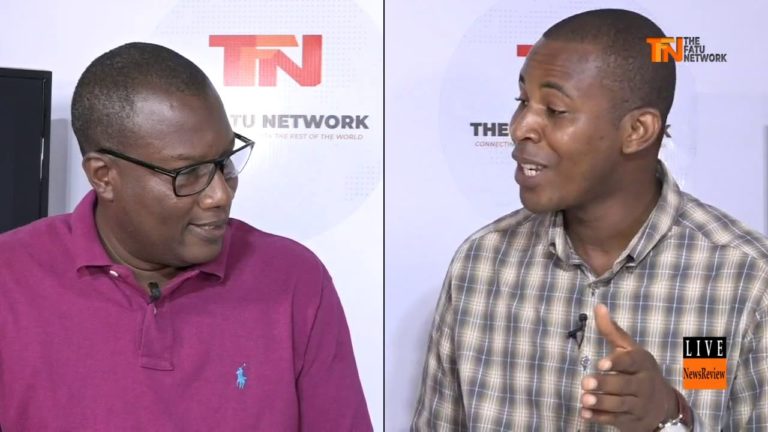
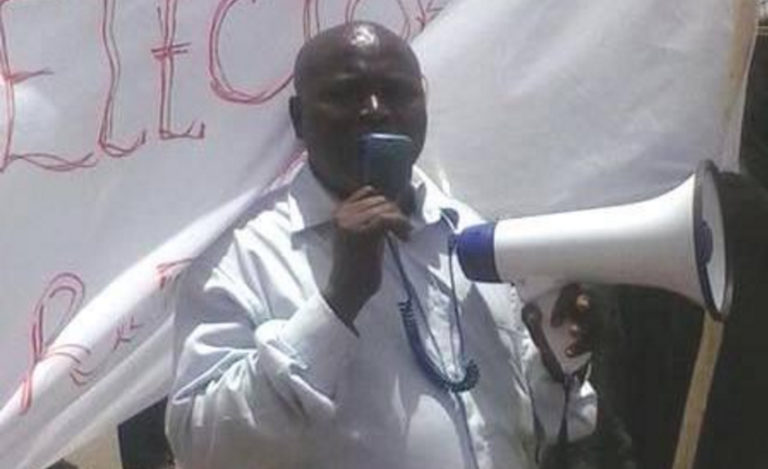
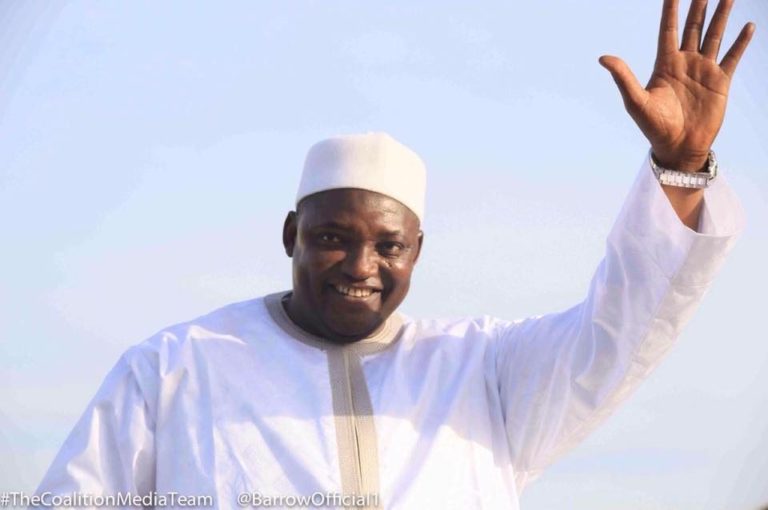
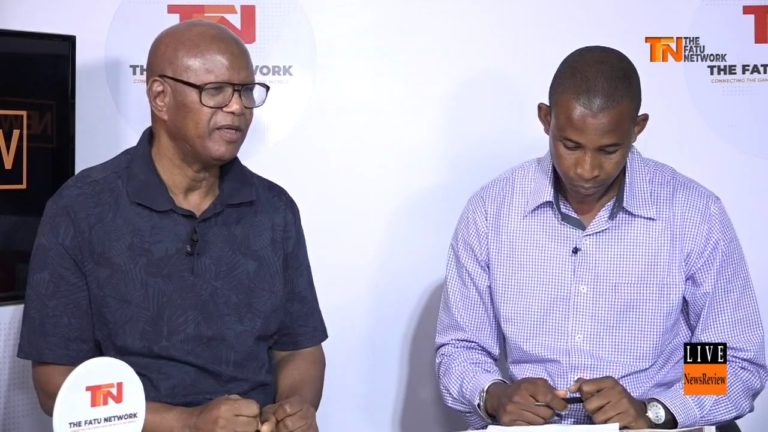
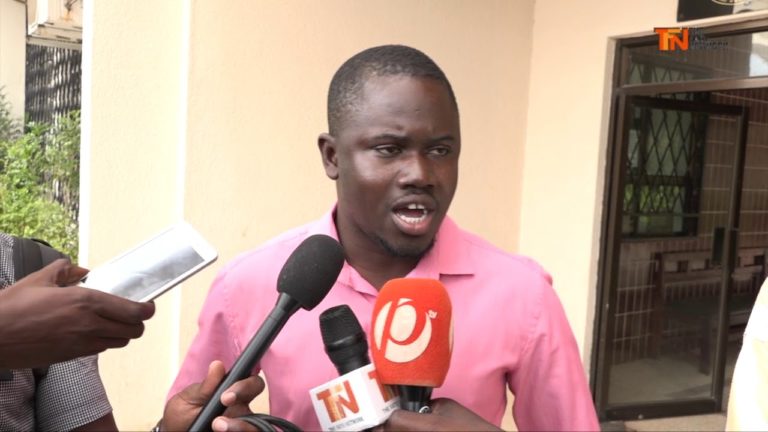
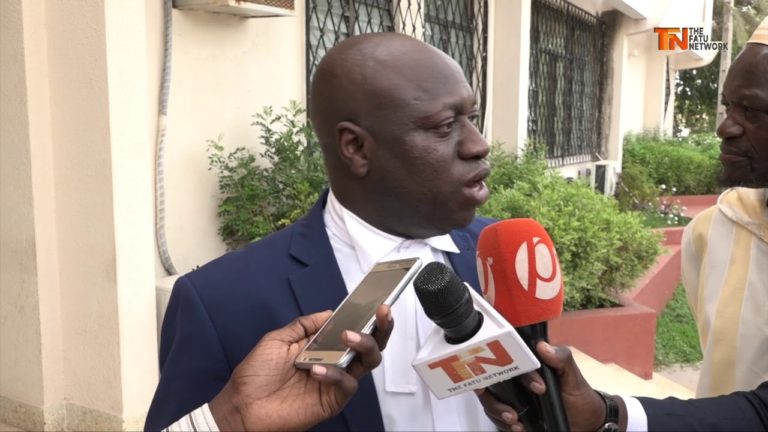
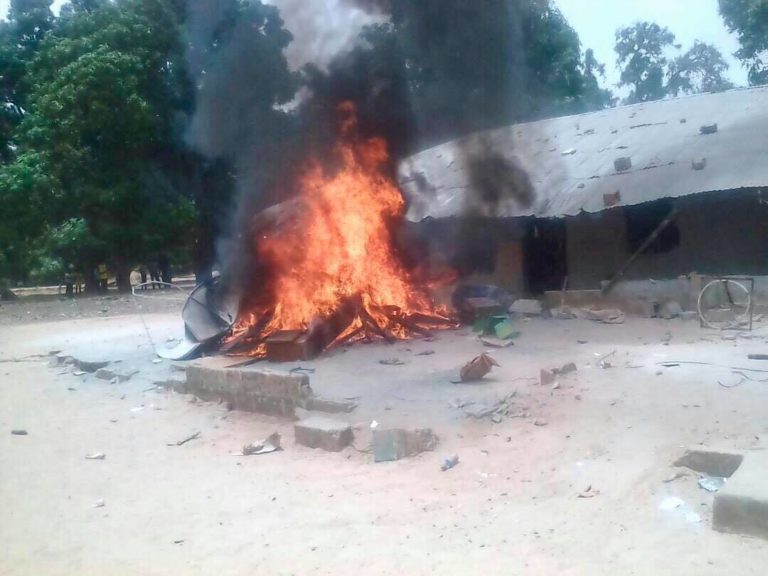
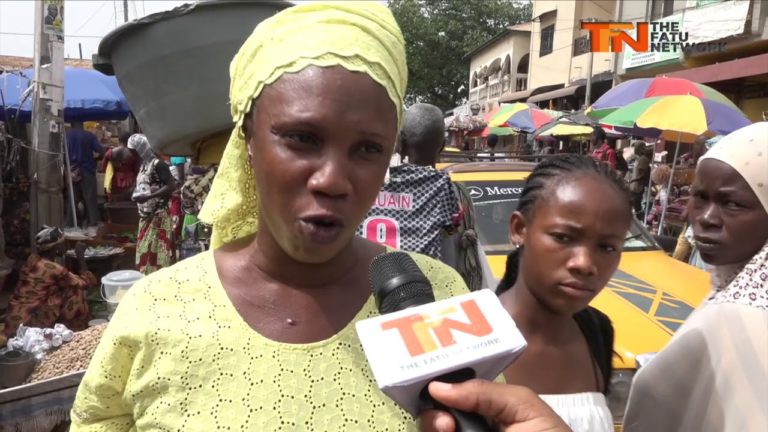
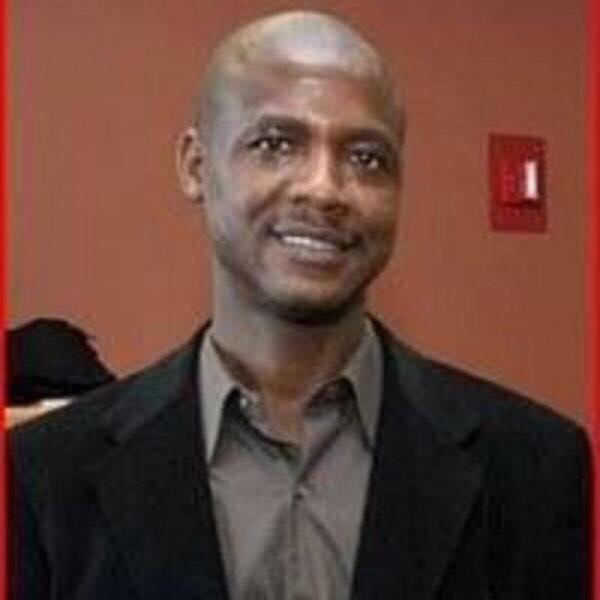
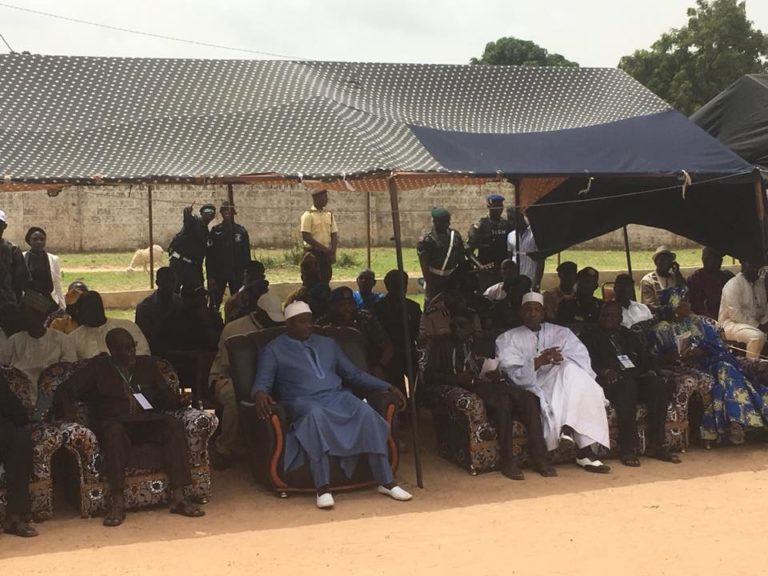
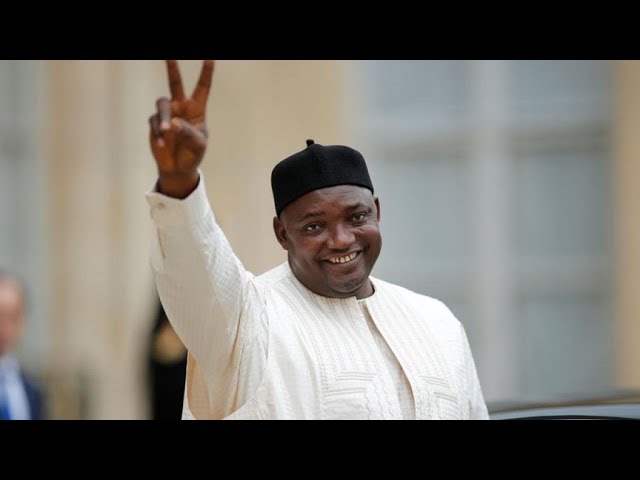
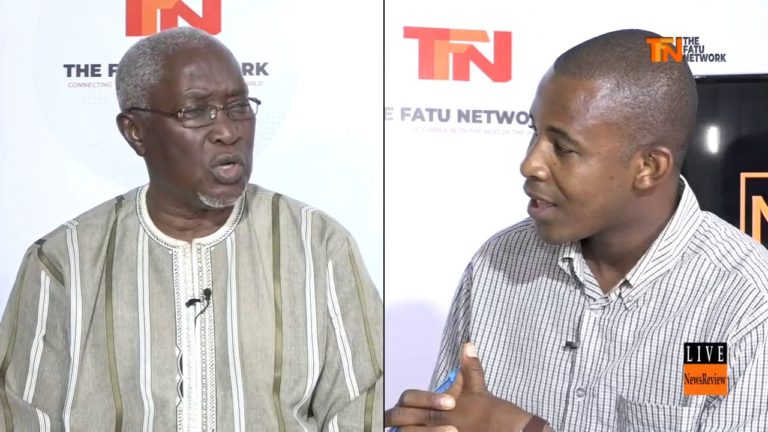


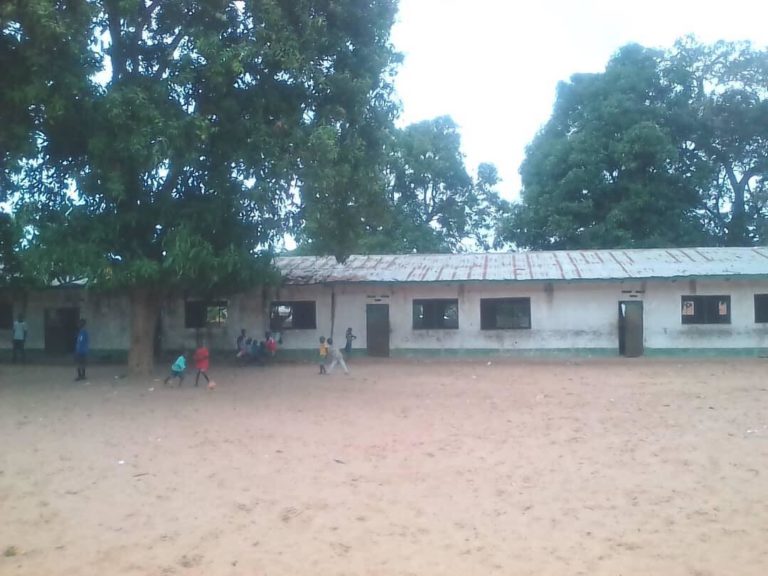
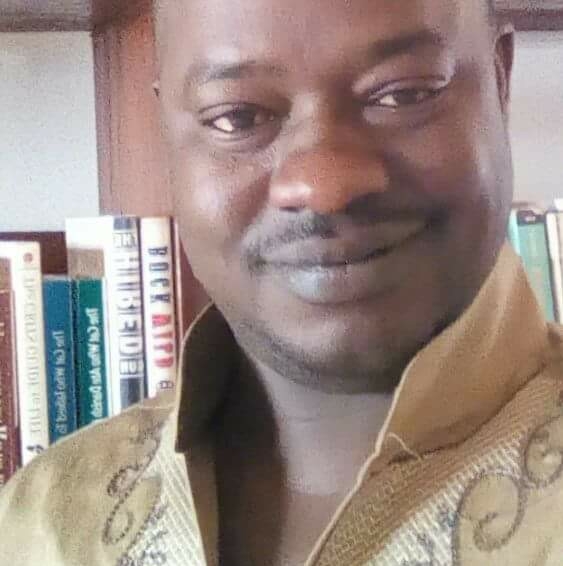
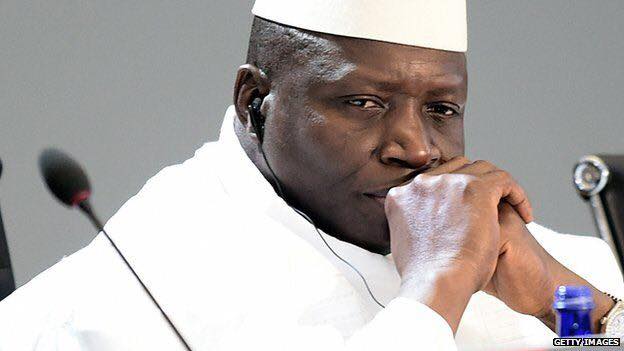
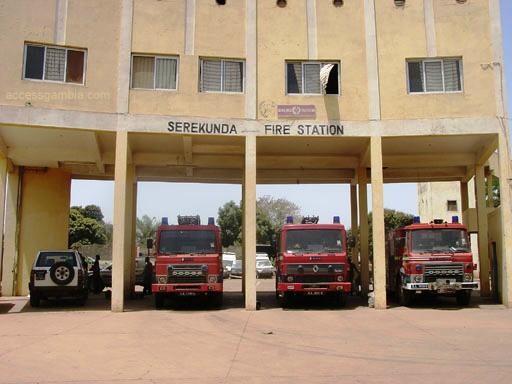
Barrow says politics is over until 2021
President Barrow says politics is over until 2021, as he addresses a meeting in Farafenni on Tuesday night.
Barrow has kept repeating this statement in all his meetings.
Many say Barrow is using the tour to respond to those wondering whether he will step down or not at the end of Coalition-agreed three years.
Barrow also uses his meeting to commend members of media for the good work. He recalled in the past when journalists were merely arrested for covering such meetings.
This, he says, was as result of the lack of transparency of the former government.
“We are open to the media because we have nothing to hide from the Gambians.”
The media, he says, is catered for in the National Development Plan.
“All the laws that were put in place to restrict the journalists will be remove,” Barrow said.
Barrow, who claimed not to be on a political tour promises more development projects to advance the development of the provincial town.
Farafenni hosts many Senegalese. He therefore thanked President Macky Sall and Government for the support to providing uninterrupted power supply in Farafenni. This, he says, shows the unity between the two country. “Macky Sall was there for the country when it was tough. He contributed in having the Ecomig forces here.”
President Barrow also thanked all the ECOWAS Heads of States for joining efforts to have the ECOMIG Force.
He used the meeting to share with people the National Development Plan.
“It was was this Plan that we took to Brussels where we received a pledge of US$1.7B. Once the money comes into the country, even the cats will know about it.”
Barrow hit at the former President, Yahya Jammeh who had promised to transform the country into Dubai and Saudi Arabia. “I am not here to give you deceiving statements.”
“Whoever comes here, tell him or her that President Barrow says “Politics is over, you can join him at State House and work together for the development of the country””
Speaking earlier on, Alhaji Mustapha Dibba of Farafenni thanked the President for the uninterrupted power supply. However, he appeals for water and electricity for the communities that are without, especially border settlement of Kerr Ali and surrounding settlements.
He informs the President that the Farafenni Police is without mobility. Dibba also appeals for a milling machine and a tractor for the Nerica Rice Growers Association in Farafenni.
Staff quarters for custom officers at the border, Dibba says, is a need for officers.
On behalf of the women of Farafenni, Fatou Ceesay appeals for a market. The existing Farafenni Market is very small and cannot accommodate all the women. “We want the government to empower us.”
Malick Samba says rice is the staple food in the country. He urges President Barrow to reduce the price of rice to the affordability of everyone.